Sesame – Organic Natural
Sesame: Sesame, scientifically known as Sesamum indicum, is a flowering plant that is primarily cultivated for its seeds, which are commonly referred to as sesame seeds. Sesame seeds have been used for thousands of years in various culinary and cultural traditions around the world. Here are some key points about sesame:
Cultivation: Sesame plants are native to Africa and India, but they are now cultivated in many parts of the world with suitable climates. Sesame seeds grow in pods and are typically harvested when the pods have dried and split open.
Varieties: There are different varieties of sesame seeds, and they come in various colors, including white, black, and brown. White sesame seeds are the most common and are often used in cooking.
Nutritional Value: Sesame seeds are a rich source of nutrients, including healthy fats, protein, dietary fiber, vitamins (such as B vitamins and vitamin E), and minerals (such as calcium, magnesium, and iron). They are particularly known for their high content of oil, which is often extracted and used in cooking.
Culinary Uses: Sesame seeds are used in a wide range of culinary applications. They are commonly sprinkled on top of bread, rolls, and baked goods. Sesame oil, derived from sesame seeds, is widely used in cooking, especially in Asian cuisines. Tahini, a paste made from ground sesame seeds, is used in Middle Eastern and Mediterranean dishes and is a key ingredient in hummus.
Flavor and Aroma: Sesame seeds have a nutty, slightly sweet flavor and a pleasant aroma. Toasting sesame seeds before use can enhance their flavor.
Sesame Allergies: Some individuals may have allergies to sesame seeds, and it is considered one of the major food allergens in some countries. Allergies to sesame can range from mild to severe.
Sesame Oil Uses: Sesame oil is not only used in cooking but also in cosmetics and traditional medicine. It is known for its potential health benefits and is sometimes used for massage and skin care.
Cultural Significance: Sesame seeds hold cultural and religious significance in various traditions. For example, they are used in certain religious rituals and are associated with good luck and prosperity in some cultures.
Sesame seeds are a versatile ingredient in the culinary world, valued for their nutritional content, flavor, and versatility in both sweet and savory dishes. Whether used as a topping, an oil, or a paste, sesame seeds have a long history of use and continue to be an important part of many cuisines.Sesame seeds are highly nutritious and packed with essential nutrients. Here are the approximate nutritional values for 1 ounce (28 grams) of dried, whole sesame seeds:
Calories: 160 calories
Total Fat: 13 grams
Saturated Fat: 2 grams
Monounsaturated Fat: 5 grams
Polyunsaturated Fat: 5 grams
Cholesterol: 0 milligrams
Sodium: 5 milligrams
Total Carbohydrates: 7 grams
Dietary Fiber: 4 grams
Sugars: 0 grams
Protein: 5 grams
Vitamins and Minerals:
Calcium: 277 milligrams (28% of the Daily Value)
Iron: 4 milligrams (22% of the Daily Value)
Magnesium: 99 milligrams (25% of the Daily Value)
Phosphorus: 179 milligrams (18% of the Daily Value)
Potassium: 129 milligrams (4% of the Daily Value)
Zinc: 2 milligrams (14% of the Daily Value)
Copper: 0.7 milligrams (37% of the Daily Value)
Manganese: 0.7 milligrams (35% of the Daily Value)
Vitamin B6: 0.2 milligrams (9% of the Daily Value)
Folate: 11 micrograms (3% of the Daily Value)
Thiamin (Vitamin B1): 0.2 milligrams (12% of the Daily Value)
Riboflavin (Vitamin B2): 0.1 milligrams (6% of the Daily Value)
Niacin (Vitamin B3): 0.2 milligrams (1% of the Daily Value)
Vitamin E: 0.2 milligrams (1% of the Daily Value)
Please note that these values are approximate and can vary depending on the variety and processing of sesame seeds. Sesame seeds are particularly rich in healthy fats, including monounsaturated and polyunsaturated fats. They are also a good source of minerals like calcium, magnesium, and iron. Additionally, sesame seeds contain antioxidants and are known for their potential health benefits, including heart health and reducing inflammation.
Keep in mind that sesame seeds are calorie-dense, so portion control is important if you’re mindful of your calorie intake. However, they can be a nutritious and flavorful addition to various dishes when used in moderation.

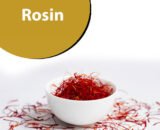

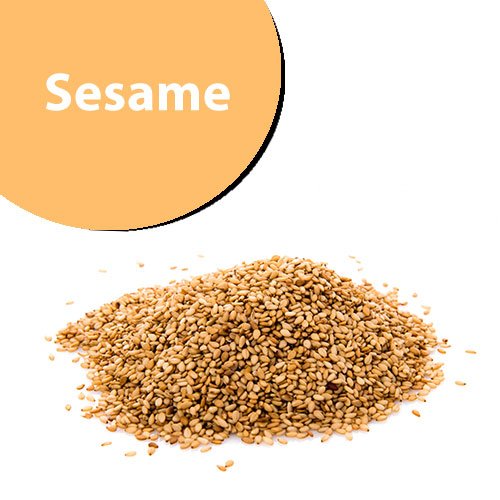
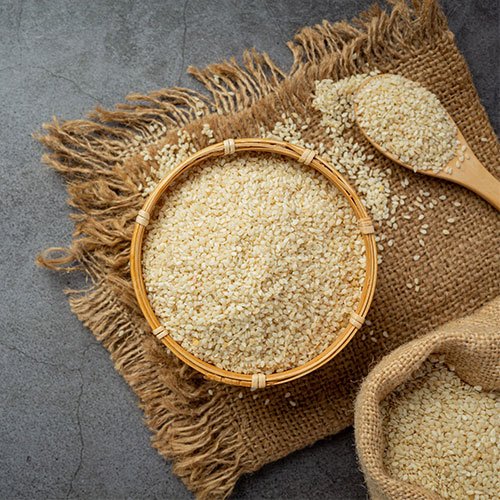
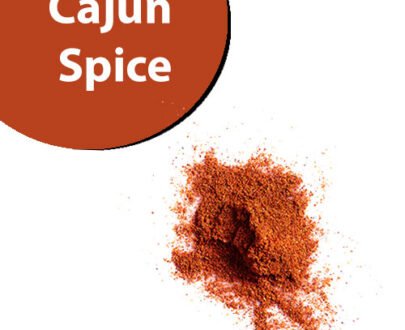
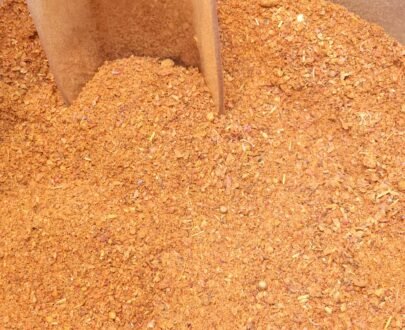




Customer reviews
Reviews
There are no reviews yet.
Write a customer review